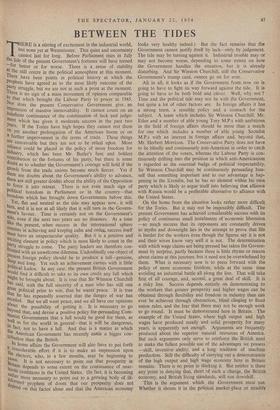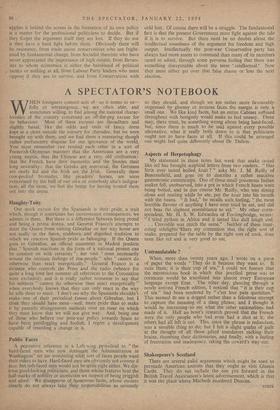BETWEEN THE TIDES
THERE is a stirring of excitement in the industrial world, but none yet at Westminster. This quiet and uncertainty cannot last for long. Before Parliament rises in July the tide of the present Government's fortunes will have turned —for better or for worse. There is a . sense of stability at the still centre in the political atmosphere at this moment. There have been points in political history at which the prophets have agreed as to the most likely outcome of the party artY struggle, but we are not at such a point at the moment. There is no sign of a mass movement of opinion comparable to that which brought the Labour Party to power in 1945. Nor does the present Conservative Government give an Impression of massive immovability. It cannot count on an Indefinite continuance of the combination of luck and judge- Inent which has given it moderate success in the past two Years. If the Tories have high hopes they cannot rest them on yet another prolongation of the American boom or on a further improvement in the terms of trade. These things are. conceivable but they are not to be relied upon. More reliance could be placed in the policy of more freedom for Industry, which has been Mr. Butler's best and boldest contribution to the fortunes of his party, but there is some doubt as to whether the Government's courage will hold if the growls from the trade unions become much fiercer. Yet if were are doubts about the Government's ability to advance, there are still greater doubts about the ability of the Opposition to force it into retreat. There is not even much sign of Political boredom in Parliament or in the country—that boredom which has brought down Governments before this. Yet, flat and neutral as the tide may appear now, it will turn, and it is not at all likely that it will turn in the Govern- ment's favour. Time is certainly not on the Government's side, even if the next two years see no disasters. At a time b-ke the, present, when success in the international sphere Consists in achieving and keeping calm and order, success itself must have an unspectacular quality. But it is a positive and exciting element in policy which is most likely to count in the Party struggle to come. The party leaders are therefore con- onted with an unwelcome dilemma. Undoubtedly one object of Present foreign policy should be to produce a lull—genuine, deep and long. Yet such an achievement carries with it little Political kudos. In any case, the present British Government Would find it difficult to take to its own credit any lull which might be brought about. It is true that Sir Winston Churchill has said, with the full sincerity of a man who has still one that political prize to win, that he wants peace. It is true 'oat he has repeatedly asserted that the danger of war has receded. But we all want peace, and we all have our opinions ,_bout the possibility of getting it. It is necessary to go °eYond that, and devise a positive policy for persuading Com- munist Governments that a lull would be good for them, as well as for the world in general—that it will be dangerous, 1,I1 fact, not to have a lull. And that is a matter in which the American Government has recently made a bigger con- tribution than the British. In home affairs the Government will also have to put forth a considerable effort if it is to make an impression upon the electors, who, in a few months, may be beginning to taw, n: It is not necessary to point out that prosperity in nialn depends to some extent on the continuance of near- boom conditions in the United States. (In fact, it becoming rather more necessary to point out to a growing body of ill- de°rmed • prophets of doom that our prosperity does not Pend on thiS factor alone and that the American economy looks very healthy indeed.) But the fact remains that the Government cannot justify itself by luck—only by judgement. The tide may be turning against it. Industrial trouble may or may not become worse, depending to some extent on how the Government handles the situation, but it is already disturbing. And 'Sir Winston Churchill, still the Conservative Government's trump card, cannot go on for ever.
All in all, it looks as if the Government from now on is going to have to fight its way forward against the tide. It is going to have to be both bold and clever. Well, why not ? Time and the political tide may not be with the Government, but quite a lot of other factors are. In foreign affairs it has a strong team, a sensible policy and a stomach for the subject. A team which includes Sir Winston Churchill, Mr. Eden and a number of able young Tory M.P.s with-ambitions in the field of foreign affairs should be more than a match for one which includes a number of able young Socialist M.P.s with an interest in foreign affairs and, beyond that, Mr. Herbert Morrison. The Conservative Party does not have to be blindly and continuously anti-American in order to catch the attention of the voters, whereas the Labour Party is con- tinuously drifting into the position in which anti-Americanism is regarded as the essential badge of political respectability. Sir Winston Churchill may be continuously persuading him- self that something important and to our advantage is hap- pening in the Kremlin, but he has no element within his own party which is likely to argue itself into believing that alliance with Russia would be a preferable alternative to alliance with the United States.
On the home front the situation looks rather more difficult for the Tories. But it may not be impossibly difficult. The present Government has achieved considerable success with its policy of continuous small instalments of 'economic liberation —so much success that its opponents are constantly driven to myths and downright lies in the attempt to prove that life is harder for the workers even though the figures say it is not and their wives know very well it is not. The determination with which wage claims are being pressed has taken the Govern- ment by surprise, partly because there is little rhyme or reason about claims at this juncture, but it need not be overwhelmed by them. What is necessary now is to press forward with the policy of more economic freedom, while at the same time avoiding an industrial battle all along the line. That will take first of all courage, and, second, a great deal of skill. It is a risky line. Success depends entirely on demonstrating to the workers that greater prosperity and higher wages can be obtained through flexibility and freedom in industry than can ever be achieved through obstruction, blind clinging to fixed union rules, and the fear that there may not be enough work to go round. It must be demonstrated here in Britain. The example of the United States, where high output and high wages have produced steady and solid prosperity for many years, is apparently not enough. Arguments are frequently produced about the superior natural resources of America. But such arguments only serve to reinforce the British need to make the fullest possible use of the advantages we possess —skill, inventive ability, and a long tradition of machine production. Still the difficulty of carrying out a demonstration of the high output and high wage economy here in Britain remains. There is no point in shirking it. But neither is there any point in denying that, short of such a change, the British economy, and British living standards, will run downhill.
This is the argument which the .Government must use. Whether it shouts it in the political market-place or steadily applies it behind the scenes in the formation of its own policy is a matter for the professional politicians to decide. But if they forget the argument itself they are lost. If they do use it they have a hard fight before them. Obviously there will be resistance, from trade union conservatives who are fright- ened by fundamental change, from Socialist theorists who have never appreciated the importance of high output, from Bevan- ites to whom economics is either the handmaid of political tactics or nothing at all, from Labour Party leaders who must oppose if they are to survive, and from Conservatives with cold feet. Of course there will be a struggle. The fundamental fact is that the present Government must fight against the tide if it is to survive. But there need be no doubts about the intellectual soundness of the argument for freedom and high output. Intellectually the post-war Conservative party has always had more assets to command than many of its members cared to admit, through some perverse feeling that there was something disreputable about the term ' intellectual.' Now they must either get over that false shame or lose the next election.



































 Previous page
Previous page